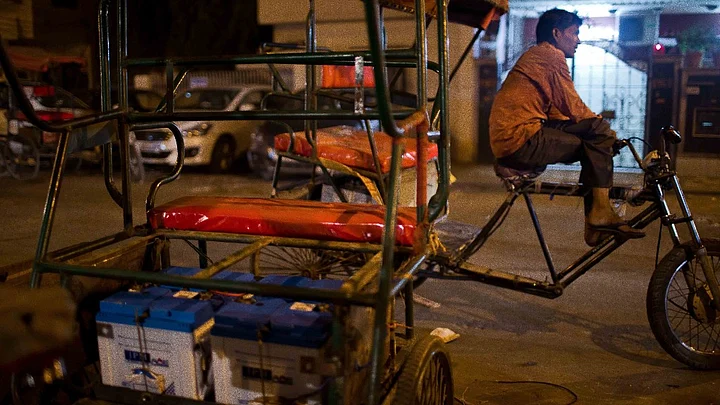In the three weeks I spent meeting people in the Valmiki basti of Chandrawal, and a few other cluster areas nearby, it’s apparent how lives of the people living here has changed completely.
Zaheer Hassan, who has been running a cycle repair shop since late 1980s, talks about how Chandrawal, which used to be only jhuggies (shanties), now has pucca houses with electricity meters installed in each of them.
Kaanta - Electricity Theft
Zaheer says that when Chandrawal Basti was only shanties, electric companies wouldn’t install meters in the houses which led to people stealing electricity using kaantas.
You just need an aluminum wire, make an S-loop with it, attach the wire connection through which electricity would be supplied in the house, and hang this loop on the electric pole.Zaheer Hassan
Since kaantas were the main source of free electricity, the raids were fairly common.
Every time the officials came to this neighbourhood, they would cut all the wires and take it with them. However, once they left, we would put the wires up again.Zaheer Hassan
The Yellow Card Sham
Back in 1998, a man claiming to be a ‘contractor’ issued yellow cards to the residents of Chandrawal. The residents paid a nominal amount every month for a year which ‘authorised’ the kaantas. During this time, the raids did not happen at all. However, a year later, the ‘contractor’ was nowhere to be found.
Rohtash says, “to tackle electricity theft, yellow cards were issued, and Rs 60 used to be collected every month; but, it didn’t work out for too long.”Rohtash
Just across this basti is Majnu Ka Tila, where 70-years-old Veena Batra works at a local bakery, selling biscuits, chips and tea.
Veena gets nostalgic as she narrates how two decades ago, when officials came for a raid in the area to remove all the kaantas, she ganged up with some neighbors, took a washing bat, and beat the officials out of the basti.
Agents of Change
After Tata Power-DDL took over Delhi Vidyut Board (DVB), they mobilised women in the area as “Abha” workers. These women are intermediaries who work to curb electricity theft, help the residents file complaints, and resolve other electricity connection related issues.
Mehender Kaur, who works as an Abha worker in Sanjay Basti, has 250 houses under her. She ensures she visits at least 10 houses each day to check if they have any unresolved issues. The day I happened to be in Sanjay Basti, Mehender was seen distributing electricity notices stating metre-removal to houses with non-payment over months.
Interviewing a few Abha workers, I came across a young, spirited girl named Rajni, who is just 22-years-old and earns close to about Rs 12,000 per month as an Abha worker.
People used to steal electricity, but after we were mobilised there has been drastic change in electricity theft.Rajni
Another independent woman, Jyoti, saw someone conducting surveys in her area and thought it to be a good way to earn money. Three years ago, she was promoted to become an Abha coordinator and has now moved out of the cluster to a rented house in Shakurpur, JJ Colony.
Illuminating New Paths
Chandrawal is now a transformed place – small-pucca houses replace the shanties and electricity has empowered people in a big way. Not only have small shops popped up, but battery-powered rickshaws have also replaced the pedal-rickshaws, which were once the main form of transportation for locals.
Vijay Kumar, who earned his daily-income as a pedal-rickshaw puller for the last 17 years, has now taken to a battery powered one.
"The work is easier, but the income is the same, pedal rickshaw would cost Rs 40 per day to rent out, and this one costs Rs 350 per day for a fully-charged one,” he said.
Speak to anyone in the various clusters of north Delhi, and you feel that mostly people are happy with the electricity situation. Most families have almost all electrical appliances, including televisions, refrigerators, washing machines, water-coolers and even air-conditioners in some well-off houses.
Women Feel Safer
Women can be seen sitting out and roaming in the streets late at night, without any worry.
Triveni, a woman in her late 50s, sits in the lanes of Kabir Nagar basti and says, “Earlier there was no electricity so we couldn’t roam even in our lanes, but now, things are better and there is no fear.”
But Hiccups Remain
But while all is well for most inhabitants in the cluster, Reshma, who recently moved to Sanjay Basti, told me how the previous owner had unpaid electricity dues which have now mounted to Rs 1.5 lakh and the power company won’t install a metre until that has been cleared. She has been asked to pay the amount in installments of Rs 10,000.
“I can either pay the installments or feed my kids,’’ she said. Reshma has sublet electricity from a neighbor and pays about Rs 800-1,000 per month.
When cases like that of Reshma are few in number in different bastis, Rohtash, the local pradhan of Chandrawal, says, “Woh Zamana bahut mushkil tha... ab toh sab kuch acha hai.”
Woh Zamana bahut mushkil tha... ab toh sab kuch acha hai.Rohtash, Pradhan, Chandrawal
The residents of Chadrawal stand testimony to the time when electricity theft was common. All these people – different shop-owners, rickshaw walas or the Abha workers – also feel that their life has been completely transformed –– that ‘power’ has really empowered them.
